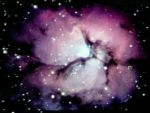CosmologyIt is not just biological evolution that poses challenges to traditional Christian views, scientific understanding of cosmological evolution also raises issues for people of faith. According to the Book of Genesis, God created the universe - and all the heavenly bodies, the sun, the moon, and the stars - in six days. But according to contemporary cosmologists the universe began with a great explosion known as the Big Bang, after which the stars and galaxies slowly formed over billions of years. Just as Darwin proposed that the evolution of life was a long, slow, and gradual process, so cosmologists now believe that our universe evolves by long slow processes. Yet if the biblical account and the scientific account don't match up in all their details, there are many parallels. Perhaps most importantly, both suggest that the universe came into being out of nothing a finite amount of time ago. Indeed, many contemporary religious believers see the Big Bang as providing confirmation for the Christian notion of creation ex nihilo (creation out of nothing). Interestingly, when evidence of the Big Bang was first discovered in the late 1920's (with Edwin Hubble’s finding that the universe was expanding), many scientists rejected the idea because they thought it smacked of religion. If the universe had a beginning they felt, then it must have had a creator. But that would be unscientific. At the time, the prevailing view was that the universe had existed in much the same state forever and that it therefore had no beginning.
This view has been expressed most famously by the English physicist Stephen Hawking. In his best-selling book "A Brief History of Time", Hawking suggested that if current cosmological theories turn out to be true then the creation of the universe will have been completely explained by the laws of physics. In that case, Hawking asks, what role would there be for a creator?
Email link | Feedback | Contributed by: Margaret Wertheim |







